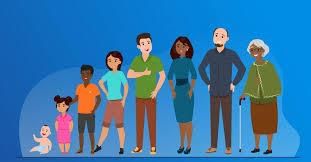Year 5 Exam > Year 5 Notes > Year 5 Science > Changes in humans during their lifetime
Changes in humans during their lifetime | Year 5 Science PDF Download
Lifecycles
- Throughout our lifetimes, as we grow from infancy to old age, we undergo changes and development.
Human Lifecycle
There are six stages in the human lifecycle:
- Foetus Stage: This initial phase marks the development of a baby inside the mother's womb. It is a crucial period for growth and formation.
- Baby Stage: Following the gestation period, a baby is born, symbolizing a new beginning and the start of a remarkable journey.
- Childhood Phase: During childhood, individuals learn fundamental skills like walking and talking, laying the foundation for their future growth.
- Adolescence Period: Adolescence bridges childhood to adulthood, characterized by significant physical and emotional changes during puberty, shaping one's identity.
- Adulthood Stage: This phase signifies the peak of physical development and maturity, where individuals may choose to start families and pursue their aspirations.
- Old Age: The final stage in the human lifecycle, where individuals reflect on their life journey, drawing wisdom from experiences and memories.

Question for Changes in humans during their lifetimeTry yourself: Which stage of the human lifecycle is characterized by significant physical and emotional changes during puberty?View Solution
The document Changes in humans during their lifetime | Year 5 Science is a part of the Year 5 Course Year 5 Science.
All you need of Year 5 at this link: Year 5
|
19 videos|22 docs|6 tests
|
FAQs on Changes in humans during their lifetime - Year 5 Science
| 1. How do humans change during their lifetime? |  |
Ans. Humans undergo physical, cognitive, emotional, and social changes as they age. These changes can include growth spurts, development of new skills, changes in personality, and forming new relationships.
| 2. What factors influence changes in humans as they age? |  |
Ans. Factors such as genetics, environment, lifestyle choices, and experiences can all influence how humans change during their lifetime. For example, a healthy diet and regular exercise can positively impact physical changes, while traumatic experiences can affect emotional and social development.
| 3. At what age do humans typically experience the most significant changes? |  |
Ans. Humans tend to experience the most significant changes during infancy, childhood, adolescence, and old age. These are stages where rapid growth, learning, and development occur, leading to noticeable changes in physical, cognitive, and emotional aspects.
| 4. How do changes in humans impact their daily lives? |  |
Ans. Changes in humans can impact their daily lives in various ways, such as affecting their abilities to perform tasks, make decisions, and interact with others. For example, physical changes may influence mobility, while cognitive changes can impact memory and problem-solving skills.
| 5. Can changes in humans be reversed or prevented? |  |
Ans. While some changes in humans are natural and inevitable, certain lifestyle choices, such as maintaining a healthy diet, staying physically active, and engaging in mental stimulation, can help slow down the aging process and prevent certain negative changes. However, some changes, such as genetic predispositions, may not be reversible.
Related Searches















